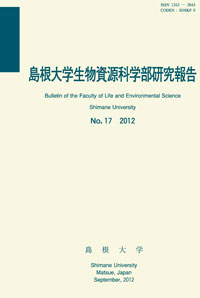島根大学生物資源科学部
ISSN:2435-0885(online)
ISSN:1343-3644(in print)
A publication of this bulletin in print format has not been made since no 24.
ISSN:1343-3644(in print)
A publication of this bulletin in print format has not been made since no 24.

number of downloads : ?
Use this link to cite this item : https://ir.lib.shimane-u.ac.jp/6445
Bulletin of the Faculty of Life and Environmental Science Shimane University 12
2007-09-30 発行
The effect of dietary energy level and rumen protozoa on urinary excretion of purine derivatives in goats
Fujihara, Tsutomu
Shem, Martin N.
Miyata, Kouhei
File
Description
The effect of dietary energy level and rumen protozoa on urinary PD excretion in goats was studied in two experiments. In experiment I, three treatment diets, low energy diet(LED), medium energy diet(MED), high energy diet(HED), with energy levels of 1.0, 1.2, 1.5 times the maintenance energy requirement respectively, were fed to three faunated goats in a 3 X 3 balanced Latin square design. The protein supply was 1.2 times the maintenance requirements. Experiment II was carried out in similar manner using the same goats after defaunation. Then, the animals were inoculated with protozoa(re-faunation)(Holotrichida and Oligotrichina, 1:9). After the 7th day of preliminary period, sampling was carried out for a period of 6 days with a diet supplying of 1.2 times the maintenance energy requirement. Total faeces and urine were collected daily before morning feeding for estimating nutrient digestibility and N balance, and urine samples were also used for determination of urinary purine derivatives(PD).The digestibilities of DM, OM, CP and NDF tended to increase(P>0.05)in defaunated animals than in faunated ones after feeding the diets with different energy level. Urinary nitrogen(N)excretion was significantly(P<0.05)increased with an increase of dietary energy, and was higher(P<0.05)in defaunated than in faunated group in three dietary treatments. Urinary PD excretion in both groups was significantly(P<0.05)lower in LED, however, urinary PD excretion in the defaunated group was significantly(P<0.05)higher than in the faunated group.
Microbial N supply calculated was significantly(P<0.05)lower in LED feeding, and was significantly(P<0.05)higher in defaunated group, although the efficiency of microbial N supply in both groups was significantly(P<0.05)lower in HED feeding. From these results, it can be concluded that protozoa and dietary energy level obviously affects on urinary PD excretion and also N metabolism in goats.
Microbial N supply calculated was significantly(P<0.05)lower in LED feeding, and was significantly(P<0.05)higher in defaunated group, although the efficiency of microbial N supply in both groups was significantly(P<0.05)lower in HED feeding. From these results, it can be concluded that protozoa and dietary energy level obviously affects on urinary PD excretion and also N metabolism in goats.
About This Article
Other Article
PP. 7 - 9
PP. 15 - 23
